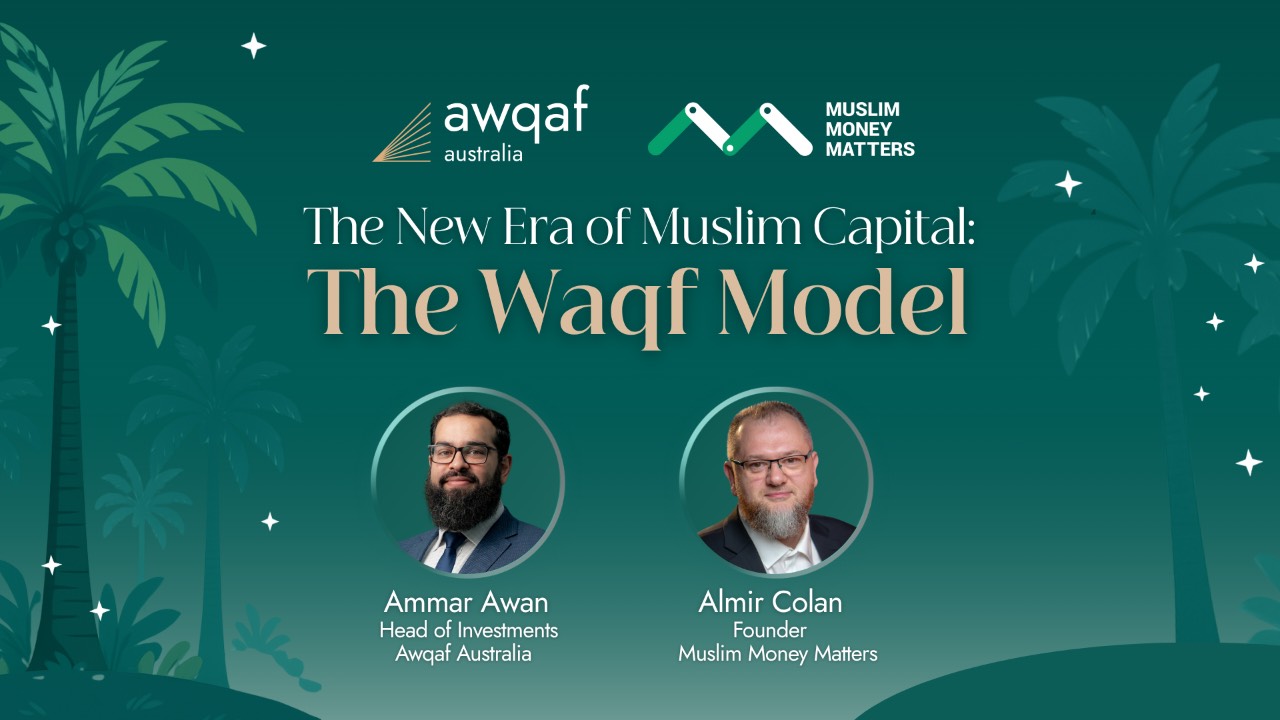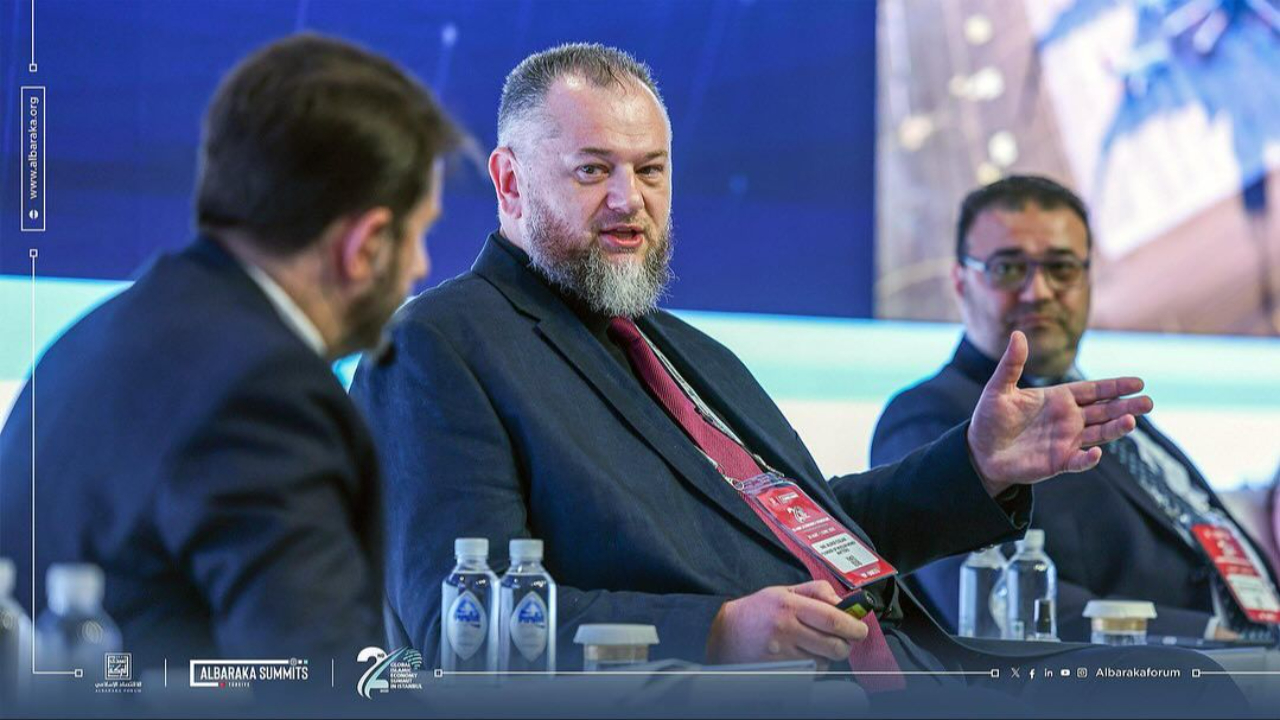My Blog
Sharing things about Islamic Finance, business and other interests...
The New Era of Muslim Capital: The Waqf Model Webinar

Join Ammar Awan (Head of Investments, Awqaf) and Almir Colan (Founder, Muslim Money Matters) for an insightful Zoom session as they discuss Past and Present Waqf Models around the World, and the future of Sustainable charity through purposeful endowments.
Lear more about Awqaf Australia: https://awqaf.org.au/
Learn more about Muslim Money Matters: https://www.muslimmoneymatters.com/
Direct link to Youtube video < here >
Wealth: Blessing or Burden for the Muslim Ummah?

Islamic finance is more than numbers. It’s about empowering the Ummah to create wealth and opportunities. Join Ibrahim and Almir Colan as they explore the road to financial freedom.
Reframing the Narrative: Islamic Economic Leadership in Focus

Join Almir Colan and expert panelists at the AlBaraka Summit as they discuss Islamic economic leadership, storytelling and reframing the global narrative.
Note: There is a minor audio issue during the first 6–7 minutes of the video.
At the 2nd Global Islamic Economy Summit in Istanbul, Almir Colan, Founder of Muslim Money Matters, emphasized the urgent need to reclaim and reshape the narrative around Islamic economic leadership. He highlighted how mainstream media often distorts or overlooks the significant achievements made by countries like Türkiye—despite persistent bias and misunderstanding.
Drawing on Türkiye’s example of building a robust industrial base, modern infrastructure, and achieving record-breaking exports with a focus on production over consumption, Almir stressed the role of strategic foresight, resilience, and innovation in driving economic success. The discussion called for bold, value-based storytelling that reflects the true essence and potential of the Is...
Don’t Lose Your Money: Islamic Guidelines to Avoid Scams & Fraud

Learn how Islamic principles can help you avoid scams and financial traps.
In this video, we explore key concepts like information asymmetry, the importance of due diligence, and recognising red flags in financial dealings.
< Watch on Youtube >
Building Türkiye's Alibaba: A 25-Year-Old Entrepreneur's Mission to Digitize Turkish Manufacturing

Join us in Istanbul for an inspiring conversation with 25-year-old entrepreneur, Baturhan, who is on a mission to digitize Turkish manufacturing and build the "Alibaba of Türkiye."
< WATCH on Youtube >
In this exclusive interview, he shares his journey from Australia to Türkiye, the challenges of starting a business abroad, and his vision to connect Turkish manufacturers with the global market.
Discover how he left everything behind to pursue his dream, the sacrifices he's made, and the insights he's gained along the way. Whether you're an aspiring entrepreneur, interested in digital business models, or curious about Türkiye’s growing economy, this episode is packed with valuable lessons and inspiration.
Contact Information:
👤 To contact Baturhan, visit his LinkedIn profile: www.linkedin.com/in/baturhankaynak/
🌐 For more about TheKaynak, visit: https://thekaynak.com
-------------------
Learn More!
To learn more about Islamic finance and economy, and to support Muslim Mon...
Islamic Finance 101 - Short Course

Welcome to Islamic Finance 101, a course introducing the core principles of Islamic finance, including contracts, transactions and ethical practices.
Watch the course on YouTube via our playlist or through the Muslim Money Matters website.
Episode 1: Introduction to Contracts & Transactions
In this first episode, we cover the fundamentals of Islamic finance, the importance of earning a livelihood, and dive into the Islamic law of contracts and business transactions. You’ll learn about the different types of transactions, ownership categories, and key conditions within contracts that shape ethical financial practices in Islam.
Episode 2: Understanding Wealth and Money
In this episode, we explore wealth and money from an Islamic perspective. Learn why wealth is both a blessing and a trial, the role of money in society, and how to use it in a way that benefits both yourself and others.
Episode 3: Key Prohibitions: Riba and Gharar
In this episode, we introduce...
Coffee Break Chat: Life, Career Choices & Lessons Along the Way

☕ Join me for a relaxed coffee break as I step back from the usual topics to share personal insights on life, career choices and lessons I've learned along the way. Let’s have a chat and hopefully you’ll find something that resonates with your own journey.
Wisdom of Islamic Finance: Rethinking Our Economic System

Explore the profound wisdom behind Islamic finance and its fundamental differences from conventional financial systems. This video contrasts the impacts of these two approaches on the economy, emphasizing how Islamic finance fosters real economic growth, while conventional finance often leads to the financialization of the economy.
Reacting to Jordan Peterson's Struggles with the Bible's Ban on Interest: An Islamic Perspective

< Watch on Youtube >
This reaction video offers an Islamic analysis of a discussion between Christian and Jewish theologians and scholars about the biblical prohibition of interest (usury). As these scholars grapple with the concept of interest in modern economics, the video presents an Islamic perspective on their interpretations and misunderstandings.
Key points covered:
- The Biblical prohibition of interest / usury
- Jewish and Christian scholars' attempts to reconcile Biblical teachings with modern economy
- Jordan Peterson's struggle to understand the wisdom behind the interest ban
- Common misconceptions about interest or usury
- The Islamic view on interest-based economics and its potential societal impacts
- A critical examination of the Christian and Jewish arguments
- Wisdom of religious teachings on finance in our current economic system
This video unpacks the complexities of interest or usury and its implications for our modern world, offering viewers a unique perspective...
Ibn Taymiyyah on Money Debasement and Inflation

< Watch on Youtube >
In this video, we explore Ibn Taymiyyah's profound insights on the dangers of money debasement and inflation. Discover how his economic wisdom remains relevant today, especially in understanding the role of government in maintaining the value of currency. Learn why Ibn Taymiyyah warned against the overproduction of money and the consequences it has on society.
*Book referenced in the video is available at https://www.almircolan.com/blog/5books
------ Learn more:
To learn more about Islamic finance and economy and to support MMM in producing future financial literacy videos like this, consider becoming a member of our Muslim Money Matters platform.
🌐 Join us at www.muslimmoneymatters.com
